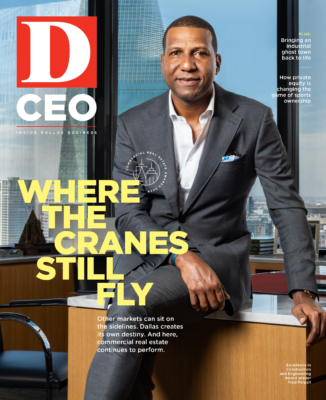Valuations for sports teams have never been higher. Mark Cuban’s recent majority interest sale of the Mavericks to the Adelson and Dumont families valued the franchise at $3.5 billion. Per Sportico, the Rangers are worth just under $2 billion, and the Stars are valued at $1.11 billion. We all know the most valuable franchise in the world is the Dallas Cowboys at $9 billion.
In recent decades, U.S. sports teams have outperformed the S&P 500. Typically, teams are owned by high-net-worth individuals, families, or corporations. But there are only so many Jerry Joneses, Mark Cubans, Rob Waltons, and Steve Ballmers of the world who can purchase a sports team and tack on billions in value. Enter private equity—which Bill Yates, co-founder of DFW sports investment fund Top Tier Sports and consultant to Rangers’ ownership, calls “the next best option to a sole owner.”
The Rangers are one of 18 MLB teams, per Pitchbook, to have a private equity connection. In late 2023, the ownership group was reportedly shopping a 10 percent sale to Sportsology Capital Partners and Ares Management that would value the World Series champs at more than $2 billion. “The Rangers are doing it right,” Yates says. “There are plenty of places to invest, whether it’s the stock market or traditional investment institutions, but firms are investing in sports because it’s a trusted place.”
The growing valuations mean this investment space is quickly becoming an arms race. Local firm Arctos Partners is one of the most active private equity players exclusively investing minority stakes in sports franchises. After raising $4.1 billion this month, firm holds about $7 billion in assets.
RedBird Capital Partners, which oversees $10 billion in assets—70 percent of which are in sports, media, or entertainment—is another big player. In 2021, its investment in Fenway Sports Group, the parent of the Boston Red Sox and Liverpool FC, valued the company at $7.35 billion in enterprise value and $6.5 billion in equity value. According to Gerry Cardinale, RedBird founder and managing partner, after adding the PGA Tour, SpringHill Co., and the Penguins to the entity, Fenway’s valuation is now between $12 billion and $13 billion. RedBird also purchased the Dallas-based XFL out of bankruptcy in 2020 for $15 million. Last year, the firm merged the XFL with the United States Football League.
“We all get lumped in as ‘private equity,’” Cardinale says. “But PE, to me, charges fees and carry, which implicitly means that we as investors are very hands-on in adding value to the companies we’re buying or building. There are other ways to invest in sports that is not PE. Taking minority stakes in teams at control premium valuations where you have no governance, limited information rights, and no pathway to liquidity is not PE. That’s unlevered or levered beta, pretty much a Schwab Index fund.” Cardinale is adamant that sports teams are not an asset class despite some investors treating it as such. “We need to be careful classifying sports as an asset class because the economic constructs underpinning sports are not necessarily developed enough to warrant it,” he says.
So, when will the dominoes fall? “European football teams trade as a multiple of revenue,” he says. “That’s lazy. They should trade as a multiple of cash flow, and once that happens, sports will be better positioned to be an asset class.”
Yates’ Top Tier Sports, co-founded by Rangers COO and Co-owner Neil Leibman, holds minority equity stakes in minor league hockey club the Allen Americans, Major League Rugby’s Dallas Jackals, minor league baseball team Cleburne Railroaders, and National Lacrosse League’s Panther City Lacrosse Club. In 2024, though, the fund is eyeing an entrance into the NHL, MLB, or MLS. “The firms investing in sports don’t just get a piece of what you see on the field or the court,” he says. “It’s the team’s real estate surrounding the stadium like restaurants or hotels, its F&B contracts, there’s tech involved—and that’s why so many investors are realizing they can use sports as their crown jewel.”
Top Tier’s first investment was the Dallas Jackals, whose COO and co-owner is Rodd Newhouse. “Interest rates and high inflation ran private equity investments in sports aground in 2023,” he says. “But interest never waned, and now, with inflation and high rates subsiding, people feel like they can put their money back on the street.”
Both the MLR and the Jackals are searching for investors. Former league commissioner George Killebrew spent a great deal of time looking for the right investor during his tenure from 2019 to 2023, he told D CEO. But at the end of the day, Killebrew wasn’t comfortable “giving up a pound of flesh” to get where the league needed to be, he says. “Private equity is still private equity,” Newhouse says. “It’s all about making money. But sports is a good investment class because even in tough economies, people still want to spend their money on sports.”
Despite the success, Cardinale warns that, yes, sports valuations are increasing, but nothing grows forever. “We’ve had these euphoric spikes, but we haven’t seen the disappointment. There’s been a linear escalation in asset valuations, but this has not kept pace with the people, infrastructure, and business models that are needed to support those valuations. To me, that constitutes to some form of a bubble.”
Author








